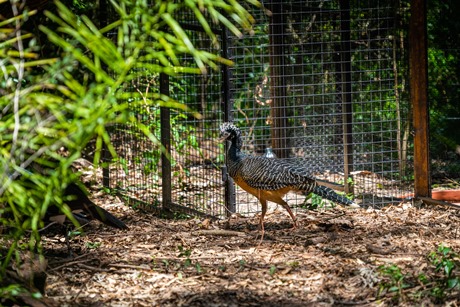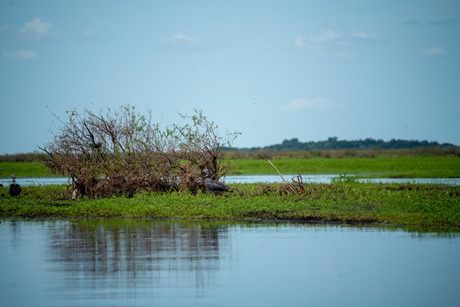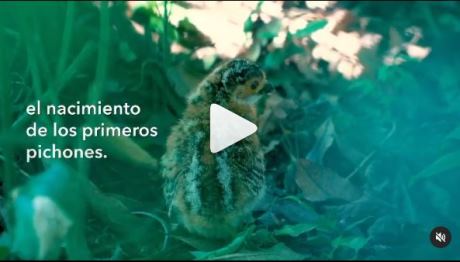About a year after the reintroduction of bare-faced curassow in the province of Corrientes, Argentina, the project has just reached an important milestone, with the first offspring's registration. The species had disappeared from Corrientes about 50 years ago and was reintroduced in a conservation unit called Gran Parque Iberá, thanks to a partnership between Itaipu Binacional (which donated the animals) with the Rewilding Argentina Foundation, and with the provincial and federal governments.

Reintroduction of bare-faced curassow to nature. Credit: Alexandre Marchetti/Itaipu
The news was announced through a video published by Rewilding Argentina on its Instagram page (/rewilding_argentina). The publication highlights the importance of the species for forest conservation (as they feed on fruits, they contribute to seed dispersal and are called "forest regenerators").
"This is a very successful project. A cycle that began with breeding in captivity and ends with natural reproduction in the environment in which they were reintroduced. There, they learned to look for food, shelter, and to flee from predators, demonstrating an excellent adaptation to the environment," says biologist Marcos José de Oliveira, from Itaipu's Protected Areas Division.
The Gran Parque Iberá is a collection of wet landscapes, such as swamps, lakes, marshes, and waterways, making up the second largest area of its kind in the world (the first being the Pantanal, in Brazil). The curassows' reintroduction to this location, which took place on January 28 of last year, was monitored by a team from National Geographic.
For Itaipu, the reintroduction of species into the wild is a very important step in the conservation efforts undertaken by the company, which for several years has already been developing captive breeding actions of threatened species typical of the Atlantic Forest (the biome in which the power plant is located).
In the Bela Vista Biological Refuge, maintained by the binational company on the Brazilian side, successful births of jaguars, tapirs, little red brockets, and harpy eagles, among other species, have been recorded. In the harpy eagle project alone there were 53 births, making this the most successful captive breeding project in the world for this species.

Gran Park Iberá. Credit: Alexandre Marchetti/Itaipu
It has even led to specimens being sent to the Beaval zoo in France and Nuremberg in Germany, which contributes to this species' ex situ preservation (outside the natural environment). This type of action is important to have a genetic reserve and also for more in-depth studies on the species, especially the endangered ones. In the extreme case of the harpy eagle disappearing from the rainforests of South America, it would still be possible to recover this bird's population.
However, with the partnership with Rewilding Argentina Foundation, these conservation initiatives take a step further. And, with the experience gained from this project, Itaipu wants to start reinserting animals, with the necessary technical and scientific rigor, into the preserved forest areas in Western Paraná. For the company, this means contributing to the forests' health and biodiversity, and biodiverse and healthy forests are more resilient to climate change and more efficient in the so-called ecosystem services, which are the free benefits that nature generates, such as water production, air purification, erosion control, reducing the impacts of climate change, among others.

Click on the image above to watch the video. Credit: Instagram
Therefore, when Itaipu works with animal reproduction and its reintroduction into the wild, it is indirectly contributing to the quality and quantity of water available in the reservoir, with impacts on the power plant's useful life and on the electricity production for Brazil and Paraguay.
Itaipu's Environment Superintendent, Ariel Scheffer da Silva, says that the strategy of preserving biodiverse forests is important for both conservation and water security, as it is the case of New York City, which was able to reverse supply crisis situations with environmental protection in the water source areas.
"The reservoir region contributes approximately 20% of the water used by Itaipu to generate energy. But with conservation actions of the forest remnants, it is possible that, in the future, we will be able to increase this percentage", says Ariel. "This proves, in practice, the relationship between ecosystem preservation, water security, and energy security," he added.